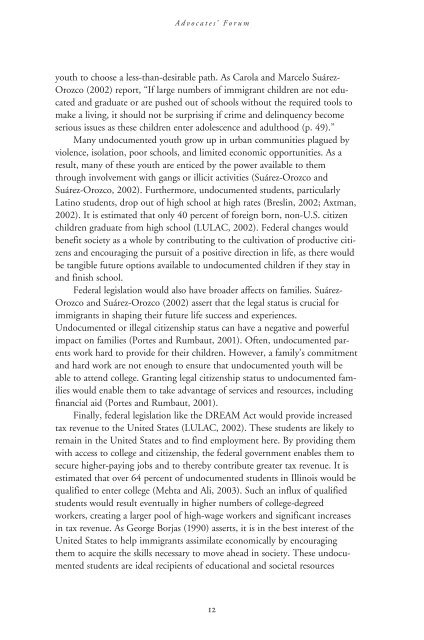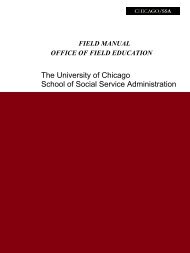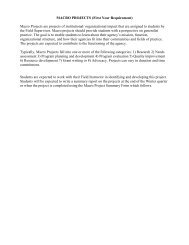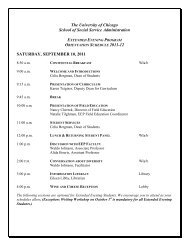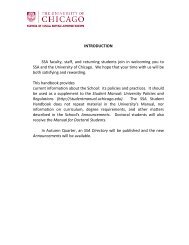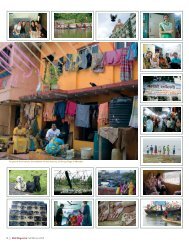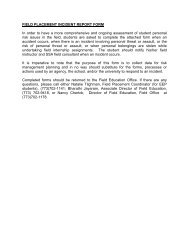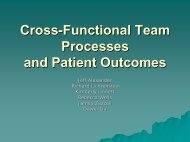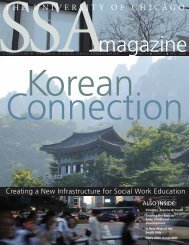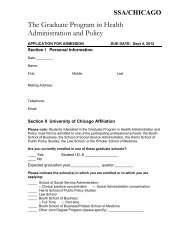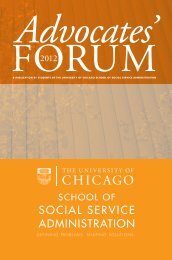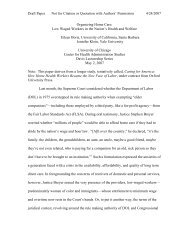2004 - School of Social Service Administration - University of Chicago
2004 - School of Social Service Administration - University of Chicago
2004 - School of Social Service Administration - University of Chicago
You also want an ePaper? Increase the reach of your titles
YUMPU automatically turns print PDFs into web optimized ePapers that Google loves.
Advocates’ Forum<br />
youth to choose a less-than-desirable path. As Carola and Marcelo Suárez-<br />
Orozco (2002) report, “If large numbers <strong>of</strong> immigrant children are not educated<br />
and graduate or are pushed out <strong>of</strong> schools without the required tools to<br />
make a living, it should not be surprising if crime and delinquency become<br />
serious issues as these children enter adolescence and adulthood (p. 49).”<br />
Many undocumented youth grow up in urban communities plagued by<br />
violence, isolation, poor schools, and limited economic opportunities. As a<br />
result, many <strong>of</strong> these youth are enticed by the power available to them<br />
through involvement with gangs or illicit activities (Suárez-Orozco and<br />
Suárez-Orozco, 2002). Furthermore, undocumented students, particularly<br />
Latino students, drop out <strong>of</strong> high school at high rates (Breslin, 2002; Axtman,<br />
2002). It is estimated that only 40 percent <strong>of</strong> foreign born, non-U.S. citizen<br />
children graduate from high school (LULAC, 2002). Federal changes would<br />
benefit society as a whole by contributing to the cultivation <strong>of</strong> productive citizens<br />
and encouraging the pursuit <strong>of</strong> a positive direction in life, as there would<br />
be tangible future options available to undocumented children if they stay in<br />
and finish school.<br />
Federal legislation would also have broader affects on families. Suárez-<br />
Orozco and Suárez-Orozco (2002) assert that the legal status is crucial for<br />
immigrants in shaping their future life success and experiences.<br />
Undocumented or illegal citizenship status can have a negative and powerful<br />
impact on families (Portes and Rumbaut, 2001). Often, undocumented parents<br />
work hard to provide for their children. However, a family’s commitment<br />
and hard work are not enough to ensure that undocumented youth will be<br />
able to attend college. Granting legal citizenship status to undocumented families<br />
would enable them to take advantage <strong>of</strong> services and resources, including<br />
financial aid (Portes and Rumbaut, 2001).<br />
Finally, federal legislation like the DREAM Act would provide increased<br />
tax revenue to the United States (LULAC, 2002). These students are likely to<br />
remain in the United States and to find employment here. By providing them<br />
with access to college and citizenship, the federal government enables them to<br />
secure higher-paying jobs and to thereby contribute greater tax revenue. It is<br />
estimated that over 64 percent <strong>of</strong> undocumented students in Illinois would be<br />
qualified to enter college (Mehta and Ali, 2003). Such an influx <strong>of</strong> qualified<br />
students would result eventually in higher numbers <strong>of</strong> college-degreed<br />
workers, creating a larger pool <strong>of</strong> high-wage workers and significant increases<br />
in tax revenue. As George Borjas (1990) asserts, it is in the best interest <strong>of</strong> the<br />
United States to help immigrants assimilate economically by encouraging<br />
them to acquire the skills necessary to move ahead in society. These undocumented<br />
students are ideal recipients <strong>of</strong> educational and societal resources<br />
12


